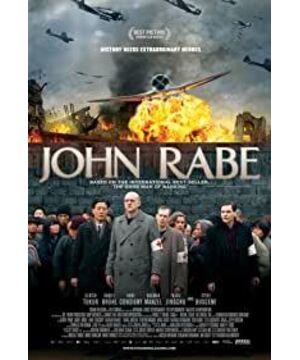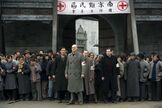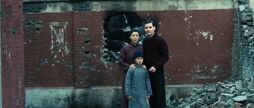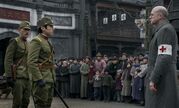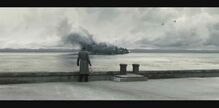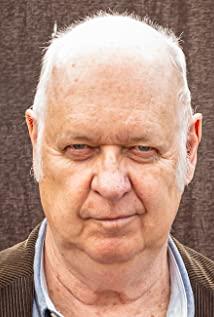Closed is anxiety, closed is melancholy eyes, closed is crying hoarse, closed is the last touch of sadness.
Yes, I'm comfortably watching Rabe's Diary, and I'm gazing at an engineer from Siemens, Germany, who has a lot to do with Nanjing and December 1937.
So, I was worried, even a little bit conflicted, seeing the full screen of comments pouring in, because for a world with multiple perspectives, what a film has to carry is not only to describe the ins and outs of a thing to you, people may I don't care about the content of the story. For a historically reproduced work of art, how the story is narrated is the operating table arranged for this film. Then, we are in this operation of cutting and reorganizing. In the room, I saw some scalpel-like, seemingly cold appearances, such as actors, cameras, themes, ideology, narrative structure, heroes and losers, pioneers and prophets.
I feel that if a film is made, it will be bombarded with saliva, whether it is humorous, joking, advocating, or cynical, sympathetic, or critical, and they all splash on the operating table together. On the white cloth, it becomes Wang Yang.
As a result, the director carried his films, like Carroll's absurd novels, surviving in the waves one after another.
This is our living environment, neither good nor bad, neither cold nor hot, neither high nor low, neither you nor me.
The young German couple next to them were obviously confused by the suppressed camera. At the scene of the killing contest, those bloody heads were neatly stacked, and I heard, as I expected, an incredible light gasp.
Obviously, they, possibly including me, recited in their hearts over and over again: Director, if you are a little more merciful, be tolerant to the audience's fragile conscience, and cut down on the scenes of massacres, rapes, broken stomachs, and burials of the elderly and the weak. lens. I think the implication is that none of us can get rid of the responsibility of history. Let us repent silently in the dark. Everyone knows it well.
In the face of cruelty, we cannot be cruel to ourselves. Angina, alright, let me shed a few tears, don't let me spend two hard hours in panic, if the director was a little more merciful, cut a little joke, but not the ending of Jack London, it's better to be a little Childlike naughty, and drunken nonsense.
I think from the point of view of empathizing with the audience, both Rabe and his director did an impeccable job, with a positive start, a tense process, and a happy ending.
All artistic creation aside, Rabe and his colleagues, Ms. Dupree, who was hiding Chinese soldiers, and Dr. Wilson, who dubbed Rabe as Nazi Swine, did everything they could during their days in the Nanjing International Security Zone. . They could not stop the Japanese atrocities against prisoners of war and civilians, but they never remained indifferent.
At the end of the film, it seems that the Chinese audience's nerves just loosened up again. It is really hard for me to imagine, in a devastated Nanjing with charred stakes and carrion on the Yangtze River, why people can still support an international humanitarian worker from a foreign country as if they had found their relatives. Let’s change the scene. For example, Rabe left Nanjing alone and sadly under the escort of the Japanese. As far as he could see, there was a hellish breath, and even the eyes of the survivors did not see a trace of light, and the silent portrait died. They mourned the victims like everyone else, they were dying of starvation, their wounds developed abscesses, and they died just as they did in Nanjing in December.
Perhaps, the director couldn't bear to let the Chinese die in such obscurity, and he couldn't bear to see Rabe and his colleagues, with their joint efforts, took 200,000 lives from the guns of the Japanese. Such obscurity, even a little desolate, left Nanjing, the former seat of the Nationalist government, the hell of 1937.
I can understand that the director's arrangement for the ending, he followed his inner Odyssey, if he can't make the Trojan hero come home triumphantly, he can't make Rabe's diary a history that the whole world will read together .
It's true that the director is good at compensating for the missing pieces of the audience, but he is better at grasping the scale of reconstruction and aesthetic creation.
This can show that he is thinking about the context of the film with his heart and pondering our pulse with his heart.
After all, we were in 2009, in a cozy movie theater with couples, reading archives with artistic processing and translation, what more could we ask for than the mottled handwriting left on a diary, we got our The desired result, the director has properly touched our nerves, whether laughing, weeping, anger, regret, this is just a movie, it looks very pale, very powerless, it can't explain itself, it's just a movie. Specimen on the operating table.
When I walked out of the movie theater, the splendid wave of knocking over the five-flavored bottle could not resist the loneliness of waiting for the bus, and it could not resist the feasting and flamboyance.
I write these gossip, but want to say to directors and producers: Thank you!
Just like when I got off the bus, I did not forget to say to the driver: Thank you! goodbye!
View more about John Rabe reviews


